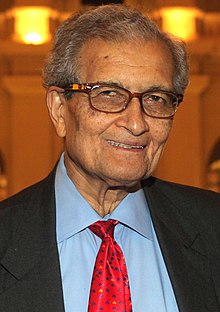
Back Amartya Sen Afrikaans أمارتيا سن Arabic امارتيا سن ARZ অমৰ্ত্য সেন Assamese अमर्त्य सेन AWA Amartya Sen Azerbaijani Амарція Сен Byelorussian Амартя Сен Bulgarian अमर्त्य सेन Bihari অমর্ত্য সেন Bengali/Bangla
Amartya Sen | |
|---|---|
 Sen in 2012 | |
| Born | Amartya Kumar Sen 3 November 1933 |
| Spouses | |
| Children | 4, including Nandana and Antara |
| Academic career | |
| Institutions | |
| Field | Welfare economics Social choice theory Development economics |
| School or tradition | Capability approach |
| Alma mater | University of Calcutta (BA) Trinity College, Cambridge (BA, MA, PhD) |
| Doctoral students | Felicia Knaul, Ingrid Robeyns |
| Influences | Gautama Buddha, Adam Smith, John Rawls, John Maynard Keynes, B. R. Ambedkar, Kenneth Arrow, Piero Sraffa, Maurice Dobb, Mary Wollstonecraft,[1] Karl Marx[2] |
| Contributions | Human development theory Entitlement approach to famine[3] |
| Awards | Nobel Memorial Prize in Economic Sciences (1998) Bharat Ratna (1999) National Humanities Medal (2012)[4] Johan Skytte Prize in Political Science (2017) |
| Information at IDEAS / RePEc | |
Amartya Kumar Sen (Bengali: [ˈɔmortːo ˈʃen]; born 3 November 1933) is an Indian economist and philosopher, who has taught and worked in the United Kingdom and the United States since 1972. Sen has made contributions to welfare economics, social choice theory, economic and social justice, economic theories of famines, decision theory, development economics, public health, and measures of well-being of countries.
He is currently a Thomas W. Lamont University Professor, and Professor of Economics and Philosophy at Harvard University.[5] He formerly served as Master of Trinity College at the University of Cambridge.[6] In 1998, he was awarded the Nobel Memorial Prize in Economic Sciences,[7] and in 1999, India's highest civilian honour — Bharat Ratna, for his contribution to welfare economics. The German Publishers and Booksellers Association awarded him the 2020 Peace Prize of the German Book Trade for his pioneering scholarship addressing issues of global justice and combating social inequality in education and healthcare.
- ^ Sen, Amartya (2010). The Idea of Justice. London: Penguin. ISBN 9780141037851.
- ^ Deneulin, Séverine (2009). "Book Reviews: Intellectual Roots of Amartya Sen: Aristotle, Adam Smith and Karl Marx". Journal of Human Development and Capabilities. 10 (2): 305–306. doi:10.1080/19452820902941628. S2CID 216114489.
- ^ Nayak, Purusottam (2000). "Understanding the Entitlement Approach to Famine". Journal of Assam University. 5: 60–65.
- ^ "President Obama Awards 2011 National Humanities Medals". National Endowment for the Humanities. 13 December 2012. Retrieved 16 June 2014.
- ^ "University Professorships". Harvard University. Retrieved 31 October 2019.
- ^ "The Master of Trinity". University of Cambridge. Archived from the original on 27 February 2021. Retrieved 27 December 2020.
- ^ "Indian Nobel laureate Amartya Sen honoured in US". The British Broadcasting Corporation. Retrieved 5 March 2017.
© MMXXIII Rich X Search. We shall prevail. All rights reserved. Rich X Search